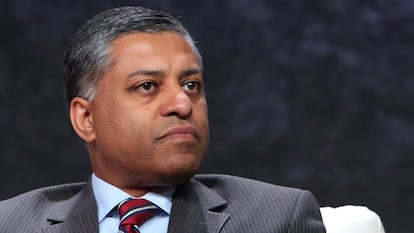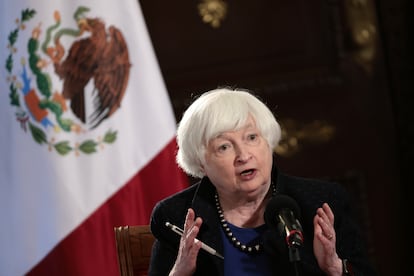Biden’s drug czar: ‘We need China to be more aggressive against fentanyl’
Rahul Gupta is the first doctor to hold the position in U.S. history. ‘The overdose death curve is flattening,’ he says in an interview with EL PAÍS


There are difficult jobs in the United States, but few as difficult as that of Rahul Gupta, the White House drug czar. He is director of the Office of National Drug Control Policy, a position to which he was appointed by Joe Biden in 2021. Gupta is in charge of combating the opioid epidemic, an old tragedy with a new actor: fentanyl. The drug’s potency — it is 50 times stronger than heroin — and its capacity for devastation are unprecedented.
Fentanyl is a substance that, until recently, almost no one had heard of outside of the operating room. Now it has swept across the streets of cities and towns in the United States, leading to record-high overdose deaths. In 2022, there were nearly 110,000 overdose deaths (two-thirds of which involved the powerful opioid). It’s similar to that of 2021, but represents a 50% rise compared to 2019.
“There has been a flattening of that [overdose death] curve. This is really significant because it tells me that, first, the policies that President Biden’s administration has enacted are working. Secondly, it’s not enough. You need to double down on the work that is happening to make sure that we do it with a sense of urgency when so many American lives are at stake,” explained Gupta by videoconference in an interview with EL PAÍS last Wednesday.
That day, U.S. Treasury Secretary Janet Yellen announced during an official visit to Mexico that the United States was sanctioning 15 individuals and two companies linked to the feared Beltrán Leyva cartel for their alleged involvement “in the transportation and distribution of deadly drugs” to the U.S. “This is in addition to the sanctions that were placed against Jalisco New Generation Cartel-affiliated entities last week, which is one of our priorities in this war,” said Gupta, who refused to link the current immigration crisis with the opiate crisis. “It’s important to emphasize that 90% or more of the fentanyl [which is much easier to transport than other non-synthetic drugs, such as heroin] that enters the United States comes through ports of entry through passenger vehicles and cargo vehicles. That’s why, the top priority of the president, who has asked Congress for supplemental funds, is to provide the appropriate drug detection machines so that we can stop as much fentanyl as possible.”

With respect to the fight against fentanyl overseas, Gupta pointed to the commitment obtained by Biden during his recent bilateral summit in San Francisco with Chinese president Xi Jinping, who agreed to pursue companies that manufacture and export the precursors used by Mexican and American laboratories to make fentanyl. “We need China to take more aggressive measures. Although that meeting was very important in order to get those conversations started.” Gupta recalled that last July Washington launched a “global coalition of over 130 countries to beat the scourge of the global synthetic drug crisis.” Mexico is in that group, but not China.
To attack the problem within U.S. borders, Gupta — the first doctor to be elevated to the position of White House drug czar — declares himself a believer in “harm reduction,” a policy he introduced at the federal level and applied in his time as a health official in West Virginia. Born in India and raised in a suburb of Washington, it was in that state, which each year has the highest percentage of overdose deaths in the entire country, where he first attracted national attention with his progressive commitment to treat the drug crisis.
“Harm reduction includes three areas,” he explained. “One: making available naloxone or Narcan [in its commercial formulation], the best antidote that exists against fentanyl overdoses. Second is syringe service programs that prevent really the spread of communicable diseases. And the third is drug testing strips for fentanyl and xylazine [known colloquially as tranq or zombie drug, a substance that enhances the effects of fentanyl and aggravates its harmful effects].” One of the most worrying facts about the “worst drug crisis in the history of the United States,” according to the U.S. Drug Enforcement Agency, is that many overdose victims die believing they had taken another drug, such as cocaine or ecstasy, because dealers cut these substances with fentanyl, which is much cheaper.
Since March, naloxone — a drug patented in the 1960s — has been available without a prescription in pharmacies and convenience stores nationwide. Gupta is “absolutely convinced” that the impact of this measure will be seen in the following overdose death statistics, “which are going down.” “Under this administration, we have made naloxone available over the counter, sitting in pharmacies right next to Tylenol and Motrin. But we are also encouraging schools, malls, public places to make sure that they keep making Narcan or naloxone available just like a fire extinguisher or a defibrillator device. Because at the end of the day, they save lives.”
The syringe problem
One of the most divisive policies of harm reduction is syringe service programs, with critics — who usually also call for a tough stance against crime — arguing that it encourages drug consumption. In neighborhoods such as Kensington (Philadelphia) or Tenderloin (San Francisco), the ease of finding a new syringe means sidewalks are often filled with needles discarded by addicts. “I have worked at the local, state and federal level, and the exchange of syringes is critical to saving people’s lives and preventing the spread of diseases. At the same time, a lot of non-government organizations and nonprofits are working to make sure that those spare needles are picked up from the street so they are not harming other people.”
Gupta sees addicts as “sick people who need treatment for a disease, like diabetes or hypertension,” instead of considering addiction “a moral failing.” And he sees traffickers as “monsters who take advantage of them.” These views are novel for the head of the Office of National Drug Control Policy, a position given to William J. Bennett during the Bush Sr. administration, who argued that legalization was equivalent to “financing cocaine for 12-year-old children.” The position of drug czar was granted a charter during the administration of Richard Nixon, the first president to declare the “war on drugs.”
More than half a century later, few would argue that the war has been won. Indeed, the United States has taken great steps in the decriminalization of marijuana and is beginning to open up to psychedelic mushrooms. “Putting addicts in prison doesn’t work,” explained Gupta. “There are two million people incarcerated. Two-thirds of them are because of the disease of addiction. One of the things we’re trying to do is to make sure that every jail and prison in the United States has access to treatment. When we do that, not only do we reduce the overdose deaths after people are released, but we also help people go back to their jobs.”
The drug czar says that the fight against opioids is one of the four points (along with the search for a cure for cancer, care for veterans and the mental health pandemic) of the “unity agenda” proposed by Biden in his first State of the Union address, in 2022. Biden called on Republicans and Democrats to work together to address those priorities, but surely nowhere else is the partisan battle more fierce than with fentanyl. Republicans are using it as another weapon in their culture wars. They blame the Biden administration’s border policies for encouraging drug trafficking, and propose that anti-terrorist measures be taken against cartels, as was done against Islamic State — rhetoric that has intensified the anti-immigration rhetoric. “This is one of those areas we don’t need to be polarized,” said Gupta. “I travel the country a lot. This is one area that affects Republicans, Democrats, independents, people that live in rural and urban areas, rich, poor, Black and white. Everybody can come together to fight this because everybody is affected and impacted.”
The issue wasn’t always this divisive. Until 2016, the opioid crisis used to be one of the few areas that brought the two Americas together. At this point in 2023, the only thing that is clear is that fentanyl will be one of the hot topics in next year’s presidential elections.
Sign up for our weekly newsletter to get more English-language news coverage from EL PAÍS USA Edition
Tu suscripción se está usando en otro dispositivo
¿Quieres añadir otro usuario a tu suscripción?
Si continúas leyendo en este dispositivo, no se podrá leer en el otro.
FlechaTu suscripción se está usando en otro dispositivo y solo puedes acceder a EL PAÍS desde un dispositivo a la vez.
Si quieres compartir tu cuenta, cambia tu suscripción a la modalidad Premium, así podrás añadir otro usuario. Cada uno accederá con su propia cuenta de email, lo que os permitirá personalizar vuestra experiencia en EL PAÍS.
¿Tienes una suscripción de empresa? Accede aquí para contratar más cuentas.
En el caso de no saber quién está usando tu cuenta, te recomendamos cambiar tu contraseña aquí.
Si decides continuar compartiendo tu cuenta, este mensaje se mostrará en tu dispositivo y en el de la otra persona que está usando tu cuenta de forma indefinida, afectando a tu experiencia de lectura. Puedes consultar aquí los términos y condiciones de la suscripción digital.








































